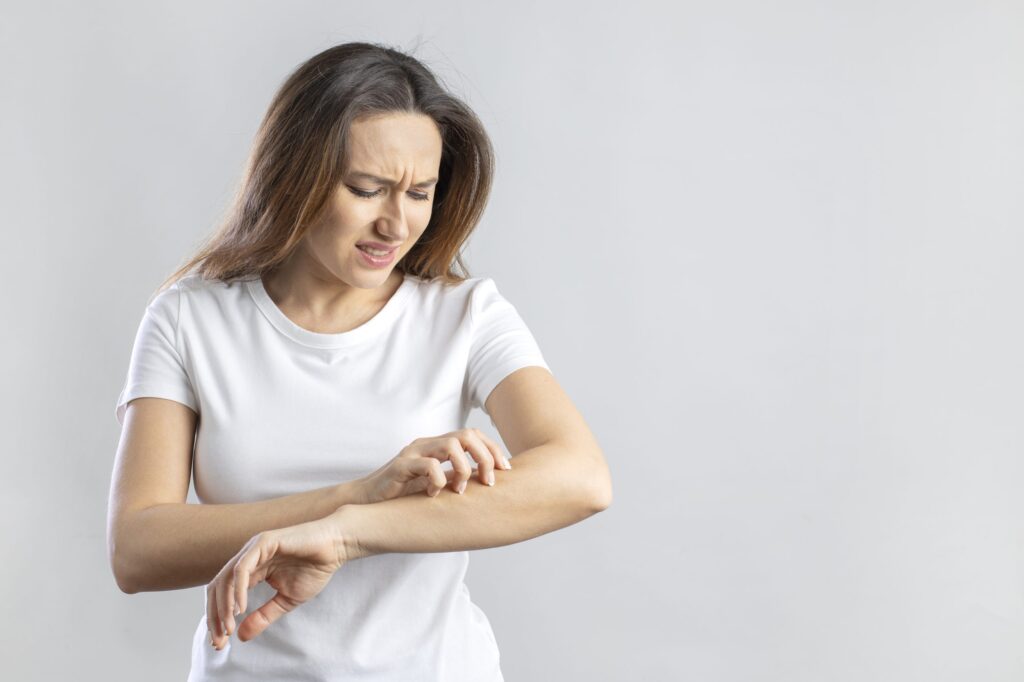Researchers at the University of Pittsburgh have uncovered new insights into the dual nature of scratching an itch, indicating that while it can worsen skin inflammation, it can also boost immune defenses against bacterial infections at the injury site.
Results from the team’s study in a mouse model of a type of eczema known as allergic contact dermatitis shed light on a pharmacologically targetable pathway that explains how scratching triggers inflammation, resolving the paradox of scratching as both a harmful pathological process and a beneficial evolutionary adaptation.
“At first, these findings seemed to introduce a paradox: If scratching an itch is bad for us, why does it feel so good?” said senior author Daniel Kaplan, MD, PhD, professor of dermatology and immunology at the University of Pittsburgh. “Scratching is often pleasurable, which suggests that, in order to have evolved, this behavior must provide some kind of benefit. Our study helps resolve this paradox by providing evidence that scratching also provides defense against bacterial skin infections.”
Kaplan is senior author of the team’s published paper in Science, titled, “Scratching promotes allergic inflammation and host defense via neurogenic mast cell activation.”
Allergic contact dermatitis is an allergic reaction to allergens or skin irritants—such as poison ivy or certain metals, for example, nickel—leading to an itchy, swollen rash. Succumbing to the urge to scratch triggers further inflammation that worsens symptoms and slows healing. “In many common skin diseases, such as dermatitis, protracted itching or pruritus—a sensation on the skin that encourages scratching—is the dominant symptom and represents a substantial source of morbidity,” the team noted. And while scratching is an “often irresistible, stereotypical, and evolutionarily conserved behavioral response” to the sensation of cutaneous itch, the team continued, it can further increase pruritus and subsequent itching, “thereby exacerbating disease in a scenario called the itch-scratch cycle.”
To figure out what drives this vicious cycle and the connection between itch, scratch, and inflammation, Kaplan, first author Andrew Liu, a student in Pitt’s Medical Scientist Training Program, and their team used itch-inducing allergens to induce eczema-like symptoms on the ears of both normal mice and of a genetically modified mouse model that doesn’t get itchy because they lack nonpeptidergic 2 (NP2) itch-sensing neurons, which are characterized by expression of the MrgprA3 receptor.
![Daniel Kaplan, MD, PhD, professor of dermatology and immunology at the University of Pittsburgh [Nate Langer, UPMC]](https://www.genengnews.com/wp-content/uploads/2025/01/low-res-10-300x200.jpeg)
When normal mice were allowed to scratch, their ears became swollen and filled with inflammatory immune cells called neutrophils. In contrast, inflammation and swelling were much milder in normal mice that physically couldn’t scratch because they wore what the researchers described as “Elizabethan collars”—similar to the cone-shaped collar a dog might have to wear after a visit to the vet—and in animals that lacked the itch-sensing neuron. This experiment confirmed that scratching further aggravated the skin.
Next, the researchers showed that scratching causes pain-sensing neurons to release a compound called substance P (SP). In turn, they showed, that SP activates mast cells, which are key coordinators of inflammation that drive itchiness and inflammation via recruitment of neutrophils. “Scratching-induced inflammation required pain-sensing nociceptors, the neuropeptide substance P, and the mast cell receptor MrgprB2,” the team stated.
“In contact dermatitis, mast cells are directly activated by allergens, which drives minor inflammation and itchiness,” Kaplan further explained. “In response to scratching, the release of substance P activates mast cells through a second pathway, so the reason that scratching triggers more inflammation in the skin is because mast cells have been synergistically activated through two pathways.”
Unlike pain, which triggers aversive behavior, scratching an itch is “often a pleasurable sensation” and does not trigger avoidance. This suggests that it may provide some benefit to the host. “The pathogenic role of scratching in diseases such as atopic dermatitis appears to be at odds with the evolutionary conservation of scratching and the pleasurable sensation of scratching an itch, thereby suggesting that there is a host benefit from scratching,” the investigators pointed out.
Mast cells are culprits in a range of inflammatory skin conditions and allergic reactions, but they’re also important for protecting against bacteria and other pathogens, and the team wondered if scratching-induced activation of mast cells could affect the skin microbiome. “Colonization and superficial infection with S. aureus along with alterations of the cutaneous microbiome are strongly associated with the development of atopic dermatitis,” they pointed out. “Given the link between scratching and allergic inflammation, we hypothesized that scratching could affect the cutaneous microbiome.
In experiments led by co-author Marlies Meisel, PhD, assistant professor of immunology at Pitt, the team also showed that scratching reduced the amount of Staphylococcus aureus—the most common bacteria involved in skin infections—on the skin. “The finding that scratching reduced S. aureus burden in the context of infection demonstrates a benefit from scratching that was previously lacking,” the investigators stated. “These findings illuminate a pharmacologically targetable mechanism by which scratching causes inflammation and reconciles the seemingly paradoxical role of scratching as a pathological process and evolutionary adaptation.”
Kaplan added, “The finding that scratching improves defense against Staphylococcus aureus suggests that it could be beneficial in some contexts. But the damage that scratching does to the skin probably outweighs this benefit when itching is chronic.”
Now, the researchers are investigating new therapies for dermatitis and other inflammatory skin conditions such as rosacea and urticaria that suppress inflammation by targeting receptors on mast cells.
In an accompanying perspective, Aaron Ver Heul, MD, PhD, at the Divison of Allergy and Immunology, John T. Milliken Department of Medicine, Washington University School of Medicine in St. Louis, said, “Beyond defining a previously unidentified neuroimmune itch-scratch circuit,” the newly reported findings “may lay a foundation for discoveries to help people suffering from chronic itch.”


